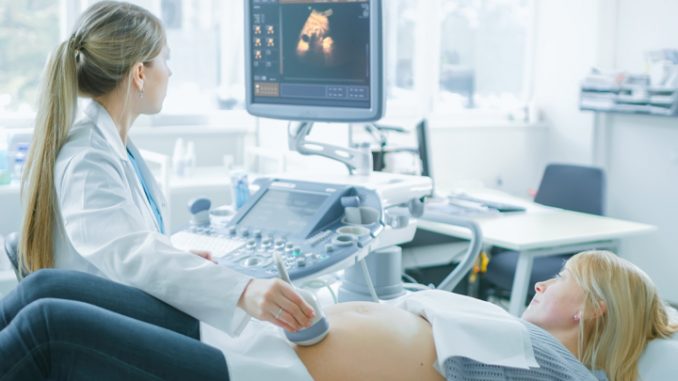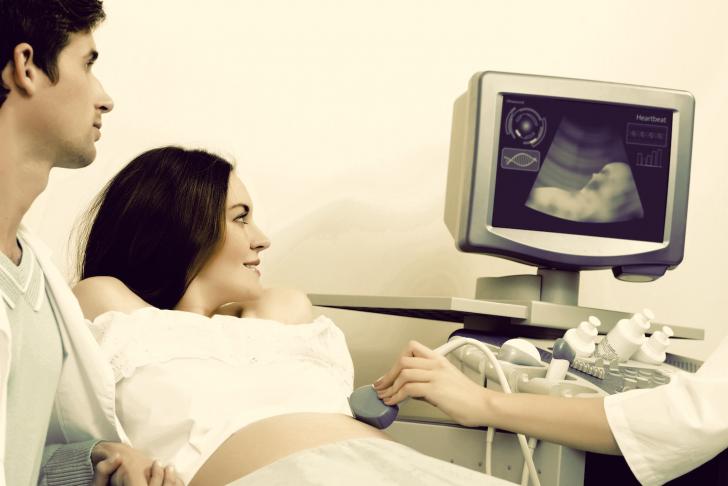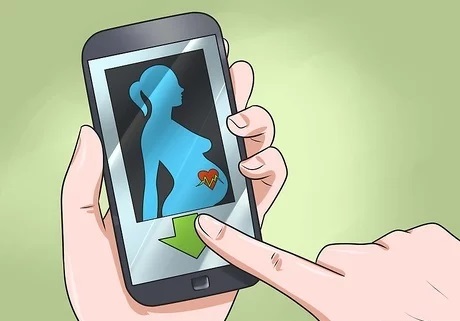
Table of Contents
Baby’s heartbeat
Hearing a baby’s heartbeat for the first time is an exciting milestone for new parents-to-be.

A fetal heartbeat may first be detected by a vaginal ultrasound as early as 5 1/2 to 6 weeks after gestation. That’s when a foetal pole, the first visible sign of a developing embryo, can sometimes be seen.
But between 6 1/2 and 7 weeks after gestation, a heartbeat can be better assessed. That’s when your doctor may schedule your first abdominal or vaginal ultrasound to check for signs of a healthy, developing pregnancy.
What to expect during your first ultrasound appointment
After a positive pregnancy test, your doctor may recommend you schedule an early pregnancy ultrasound scan around 7 1/2 to 8 weeks of pregnancy. Some medical practices don’t schedule the first ultrasound until between 11 and 14 weeks.
Your doctor may recommend this scan as early as 6 weeks if you:
- Have a prior medical condition
- I have had a miscarriage.
- I have had difficulty maintaining a pregnancy in the past.
During your first ultrasound appointment, the doctor or ultrasound technician will check for the following:
- Check for a viable pregnancy and non-viable molar or ectopic pregnancy.
- Confirm the baby’s heartbeat
- Measure the baby’s crown-to-rump length, which can help determine gestational age.
- Assess abnormal gestation.
Baby’s heart rate

At 6 to 7 weeks, your baby’s heart rate should be 90-110 beats per minute (bpm). Your baby’s heartbeat should be 140–170 beats per minute (bpm) by the ninth week.
This is why you may not be able to hear your baby’s heartbeat.
The heartbeat of a newborn may not be audible during your first ultrasound. The most common reason for this is that the pregnancy is too early. This doesn’t necessarily imply that there is a problem, though.
One to two weeks later, your doctor may advise you to have another ultrasound.
Other possible explanations for the absence of a heartbeat are as follows:
- Having a uterus that is tipped
- Having a large belly
- It is less far along than you thought.
Pregnant women will have their foetal measurements taken by their doctor in case there is no heartbeat. If an embryo’s crown-rump length is greater than 5 millimetres and there is no foetal heartbeat, your doctor may be concerned.
According to your doctor, the absence of a gestational sac is also cause for concern by the end of week six. To be sure you’re pregnant, your doctor may order a blood test or have you return a few days later for another ultrasound.
A long-term study of 325 miscarriages in the United Kingdom in 1999 discovered that if a heartbeat is discovered at 6 weeks, there is a 78 percent chance that the pregnancy will continue.At 8 weeks, the chance is 98 percent, and at 10 weeks, it’s 99.4 percent.
What do you use to listen to a baby’s heartbeat?
Your doctor or an ultrasound tech will use a transvaginal ultrasound or a 2D or 3D abdominal ultrasound for your first scan.
During the first few weeks of pregnancy, a transvaginal ultrasound is used to get a clear picture of the embryo. A 3D ultrasound lets the doctor see the foetus and your organs better in terms of their width, height, and depth.
Can a human ear hear a baby’s heartbeat?
The human ear has a hard time, if not can’t at all, hearing a foetal heartbeat.
But some women who are pregnant say they can hear their baby’s heartbeat through their stomach. This might be possible late in the second or third trimester, in a quiet room.
If you can’t hear your baby’s heartbeat at home, don’t worry.
If you are worried about your baby’s heartbeat, the safest thing to do is to talk to your doctor. They can set up a sonogram to show you that the heartbeat of your baby is normal.
Can apps be used to listen to a baby’s heartbeat?

Parents-to-be can now buy hundreds of apps and devices that let them listen to their baby’s heartbeat at home. But your doctor may tell you not to do something you can do at home.
The quality of these devices and apps is very different. They might give you a wrong reading of your heartbeat and make you worry or panic for no reason.
Ask your doctor if there is a device you can use at home. They will be able to tell you if it’s safe for you to use while you’re pregnant.
Takeaway
At each prenatal visit, your doctor will listen to your baby’s heartbeat. As early as 6 weeks, you might be able to hear your baby’s heartbeat for the first time.
Talk to your doctor if you worry about your baby’s heartbeat. During your pregnancy and while you are in labour and giving birth, your prenatal team can keep a close eye on the heartbeat.
